The First Sino-Japanese War & NE Asia
VerifiedAdded on 2023/03/20
|10
|2753
|58
AI Summary
This essay discusses the First Sino-Japanese War and its impact on North East Asia. It covers the causes of the war, the major battles, and the treaties signed between Japan and China. The war marked a turning point in the international order of the region and led to the modernization and industrialization of Japan.
Contribute Materials
Your contribution can guide someone’s learning journey. Share your
documents today.
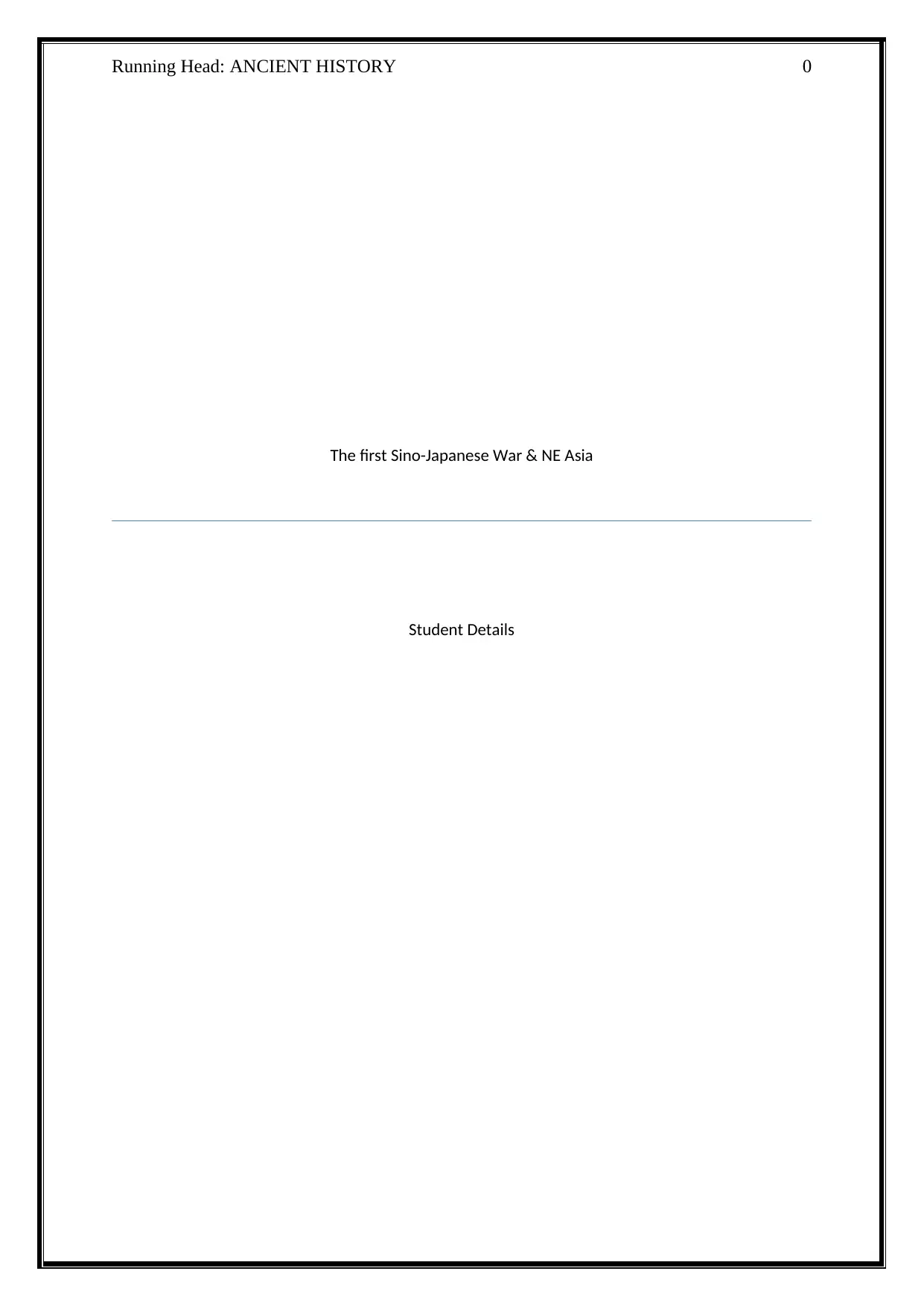
Running Head: ANCIENT HISTORY 0
The first Sino-Japanese War & NE Asia
Student Details
The first Sino-Japanese War & NE Asia
Student Details
Secure Best Marks with AI Grader
Need help grading? Try our AI Grader for instant feedback on your assignments.

ANCIENT HISTORY 1
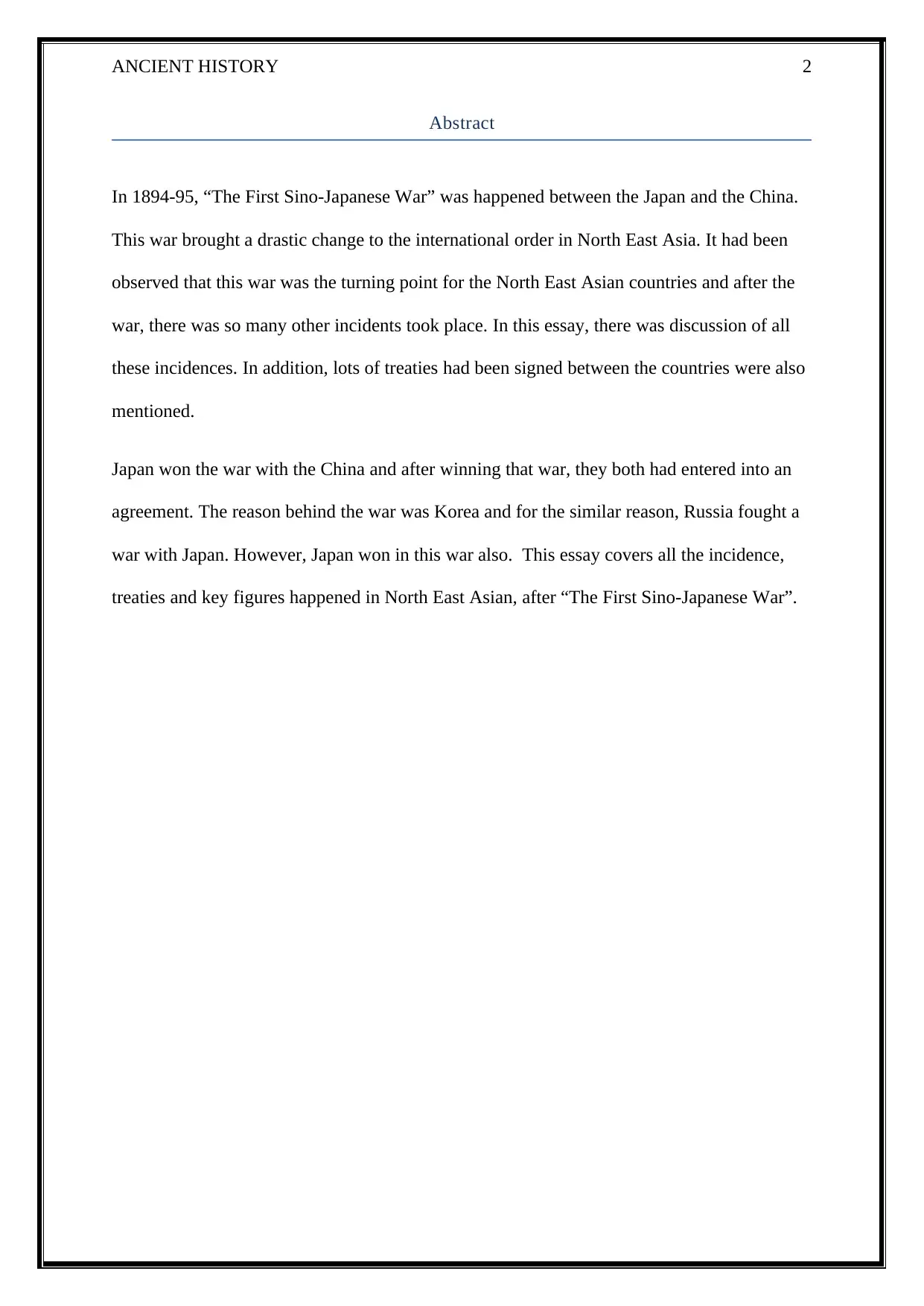
ANCIENT HISTORY 2
Abstract
In 1894-95, “The First Sino-Japanese War” was happened between the Japan and the China.
This war brought a drastic change to the international order in North East Asia. It had been
observed that this war was the turning point for the North East Asian countries and after the
war, there was so many other incidents took place. In this essay, there was discussion of all
these incidences. In addition, lots of treaties had been signed between the countries were also
mentioned.
Japan won the war with the China and after winning that war, they both had entered into an
agreement. The reason behind the war was Korea and for the similar reason, Russia fought a
war with Japan. However, Japan won in this war also. This essay covers all the incidence,
treaties and key figures happened in North East Asian, after “The First Sino-Japanese War”.
Abstract
In 1894-95, “The First Sino-Japanese War” was happened between the Japan and the China.
This war brought a drastic change to the international order in North East Asia. It had been
observed that this war was the turning point for the North East Asian countries and after the
war, there was so many other incidents took place. In this essay, there was discussion of all
these incidences. In addition, lots of treaties had been signed between the countries were also
mentioned.
Japan won the war with the China and after winning that war, they both had entered into an
agreement. The reason behind the war was Korea and for the similar reason, Russia fought a
war with Japan. However, Japan won in this war also. This essay covers all the incidence,
treaties and key figures happened in North East Asian, after “The First Sino-Japanese War”.
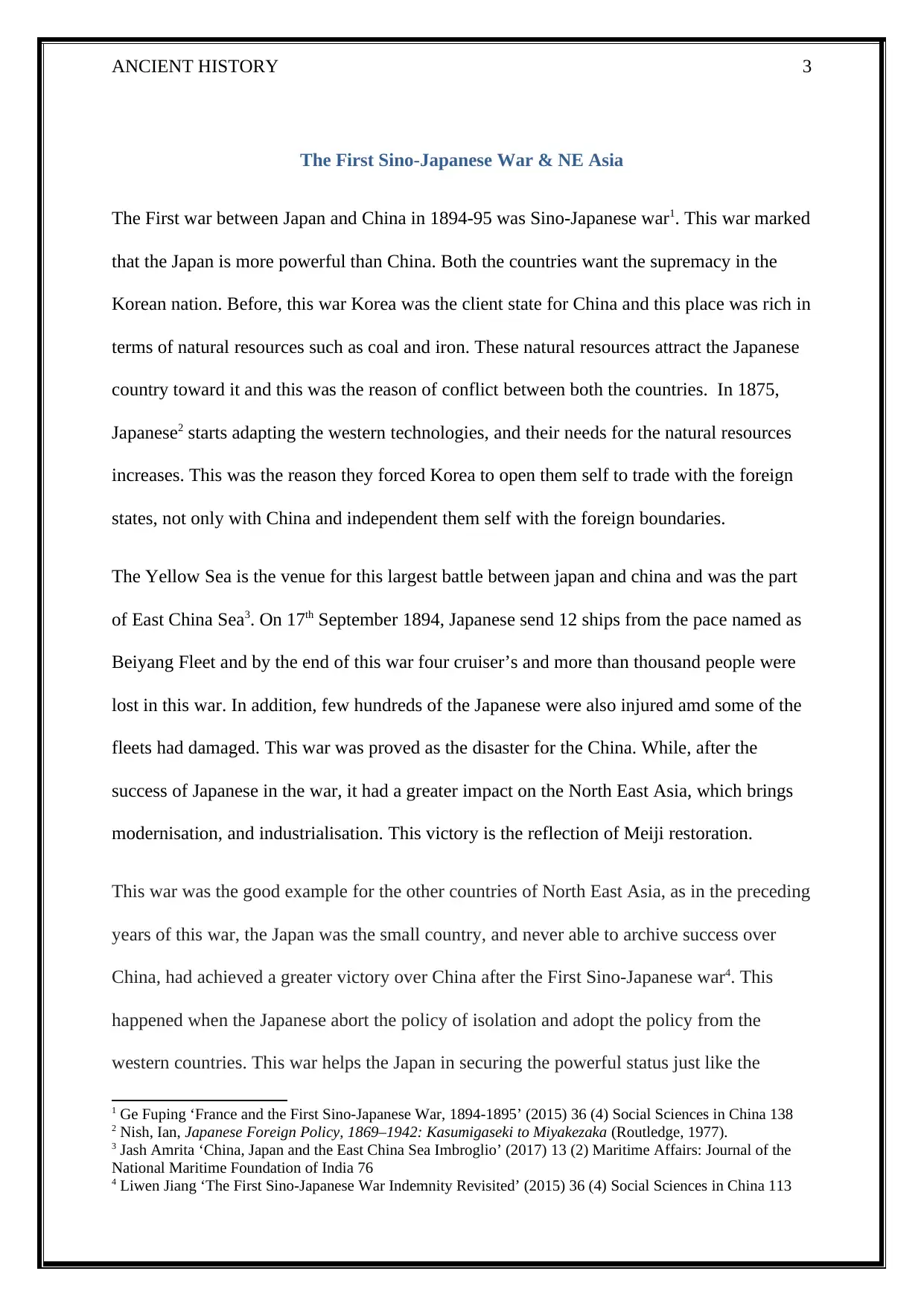
ANCIENT HISTORY 3
The First Sino-Japanese War & NE Asia
The First war between Japan and China in 1894-95 was Sino-Japanese war1. This war marked
that the Japan is more powerful than China. Both the countries want the supremacy in the
Korean nation. Before, this war Korea was the client state for China and this place was rich in
terms of natural resources such as coal and iron. These natural resources attract the Japanese
country toward it and this was the reason of conflict between both the countries. In 1875,
Japanese2 starts adapting the western technologies, and their needs for the natural resources
increases. This was the reason they forced Korea to open them self to trade with the foreign
states, not only with China and independent them self with the foreign boundaries.
The Yellow Sea is the venue for this largest battle between japan and china and was the part
of East China Sea3. On 17th September 1894, Japanese send 12 ships from the pace named as
Beiyang Fleet and by the end of this war four cruiser’s and more than thousand people were
lost in this war. In addition, few hundreds of the Japanese were also injured amd some of the
fleets had damaged. This war was proved as the disaster for the China. While, after the
success of Japanese in the war, it had a greater impact on the North East Asia, which brings
modernisation, and industrialisation. This victory is the reflection of Meiji restoration.
This war was the good example for the other countries of North East Asia, as in the preceding
years of this war, the Japan was the small country, and never able to archive success over
China, had achieved a greater victory over China after the First Sino-Japanese war4. This
happened when the Japanese abort the policy of isolation and adopt the policy from the
western countries. This war helps the Japan in securing the powerful status just like the
1 Ge Fuping ‘France and the First Sino-Japanese War, 1894-1895’ (2015) 36 (4) Social Sciences in China 138
2 Nish, Ian, Japanese Foreign Policy, 1869–1942: Kasumigaseki to Miyakezaka (Routledge, 1977).
3 Jash Amrita ‘China, Japan and the East China Sea Imbroglio’ (2017) 13 (2) Maritime Affairs: Journal of the
National Maritime Foundation of India 76
4 Liwen Jiang ‘The First Sino-Japanese War Indemnity Revisited’ (2015) 36 (4) Social Sciences in China 113
The First Sino-Japanese War & NE Asia
The First war between Japan and China in 1894-95 was Sino-Japanese war1. This war marked
that the Japan is more powerful than China. Both the countries want the supremacy in the
Korean nation. Before, this war Korea was the client state for China and this place was rich in
terms of natural resources such as coal and iron. These natural resources attract the Japanese
country toward it and this was the reason of conflict between both the countries. In 1875,
Japanese2 starts adapting the western technologies, and their needs for the natural resources
increases. This was the reason they forced Korea to open them self to trade with the foreign
states, not only with China and independent them self with the foreign boundaries.
The Yellow Sea is the venue for this largest battle between japan and china and was the part
of East China Sea3. On 17th September 1894, Japanese send 12 ships from the pace named as
Beiyang Fleet and by the end of this war four cruiser’s and more than thousand people were
lost in this war. In addition, few hundreds of the Japanese were also injured amd some of the
fleets had damaged. This war was proved as the disaster for the China. While, after the
success of Japanese in the war, it had a greater impact on the North East Asia, which brings
modernisation, and industrialisation. This victory is the reflection of Meiji restoration.
This war was the good example for the other countries of North East Asia, as in the preceding
years of this war, the Japan was the small country, and never able to archive success over
China, had achieved a greater victory over China after the First Sino-Japanese war4. This
happened when the Japanese abort the policy of isolation and adopt the policy from the
western countries. This war helps the Japan in securing the powerful status just like the
1 Ge Fuping ‘France and the First Sino-Japanese War, 1894-1895’ (2015) 36 (4) Social Sciences in China 138
2 Nish, Ian, Japanese Foreign Policy, 1869–1942: Kasumigaseki to Miyakezaka (Routledge, 1977).
3 Jash Amrita ‘China, Japan and the East China Sea Imbroglio’ (2017) 13 (2) Maritime Affairs: Journal of the
National Maritime Foundation of India 76
4 Liwen Jiang ‘The First Sino-Japanese War Indemnity Revisited’ (2015) 36 (4) Social Sciences in China 113
Secure Best Marks with AI Grader
Need help grading? Try our AI Grader for instant feedback on your assignments.
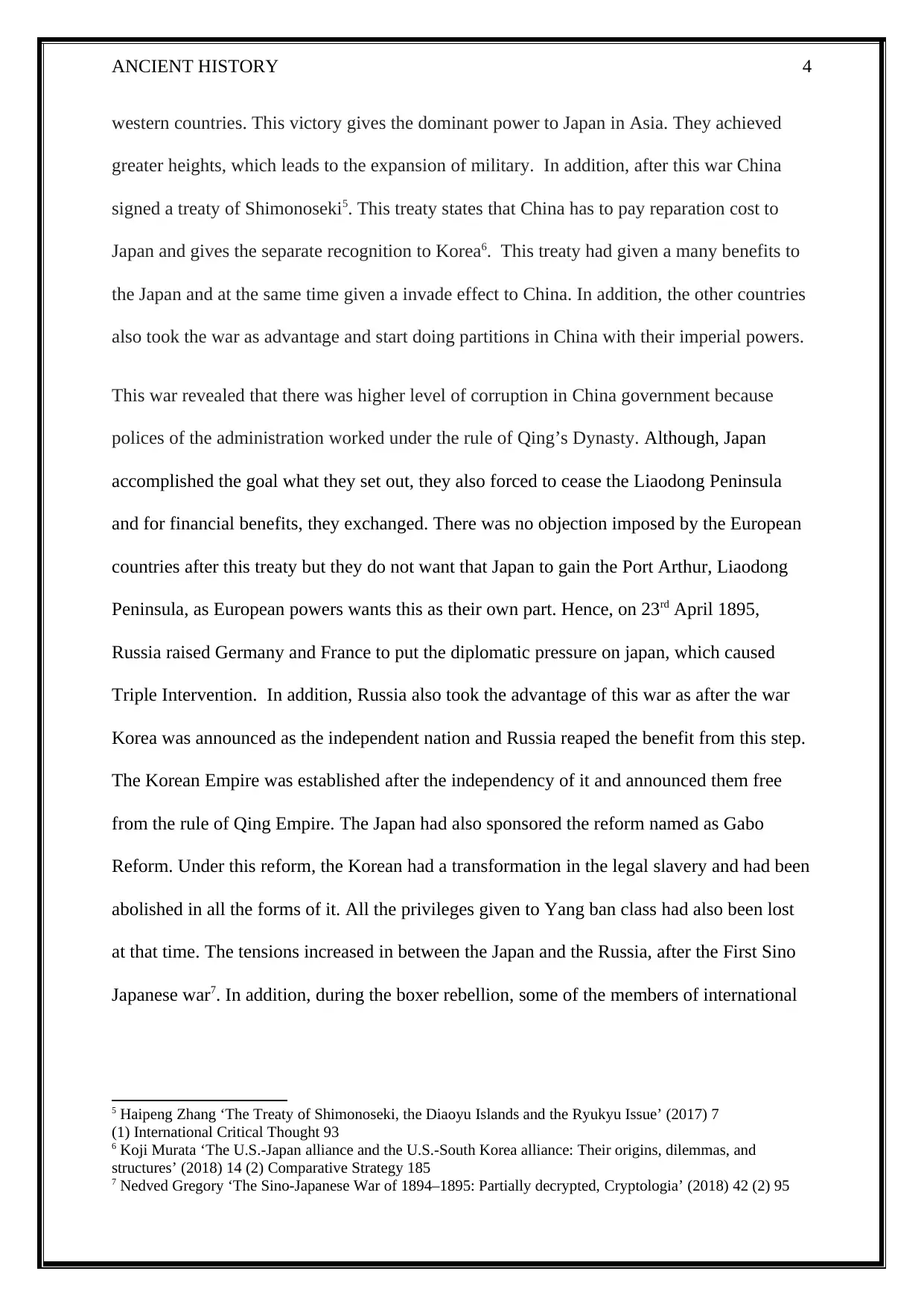
ANCIENT HISTORY 4
western countries. This victory gives the dominant power to Japan in Asia. They achieved
greater heights, which leads to the expansion of military. In addition, after this war China
signed a treaty of Shimonoseki5. This treaty states that China has to pay reparation cost to
Japan and gives the separate recognition to Korea6. This treaty had given a many benefits to
the Japan and at the same time given a invade effect to China. In addition, the other countries
also took the war as advantage and start doing partitions in China with their imperial powers.
This war revealed that there was higher level of corruption in China government because
polices of the administration worked under the rule of Qing’s Dynasty. Although, Japan
accomplished the goal what they set out, they also forced to cease the Liaodong Peninsula
and for financial benefits, they exchanged. There was no objection imposed by the European
countries after this treaty but they do not want that Japan to gain the Port Arthur, Liaodong
Peninsula, as European powers wants this as their own part. Hence, on 23rd April 1895,
Russia raised Germany and France to put the diplomatic pressure on japan, which caused
Triple Intervention. In addition, Russia also took the advantage of this war as after the war
Korea was announced as the independent nation and Russia reaped the benefit from this step.
The Korean Empire was established after the independency of it and announced them free
from the rule of Qing Empire. The Japan had also sponsored the reform named as Gabo
Reform. Under this reform, the Korean had a transformation in the legal slavery and had been
abolished in all the forms of it. All the privileges given to Yang ban class had also been lost
at that time. The tensions increased in between the Japan and the Russia, after the First Sino
Japanese war7. In addition, during the boxer rebellion, some of the members of international
5 Haipeng Zhang ‘The Treaty of Shimonoseki, the Diaoyu Islands and the Ryukyu Issue’ (2017) 7
(1) International Critical Thought 93
6 Koji Murata ‘The U.S.‐Japan alliance and the U.S.‐South Korea alliance: Their origins, dilemmas, and
structures’ (2018) 14 (2) Comparative Strategy 185
7 Nedved Gregory ‘The Sino-Japanese War of 1894–1895: Partially decrypted, Cryptologia’ (2018) 42 (2) 95
western countries. This victory gives the dominant power to Japan in Asia. They achieved
greater heights, which leads to the expansion of military. In addition, after this war China
signed a treaty of Shimonoseki5. This treaty states that China has to pay reparation cost to
Japan and gives the separate recognition to Korea6. This treaty had given a many benefits to
the Japan and at the same time given a invade effect to China. In addition, the other countries
also took the war as advantage and start doing partitions in China with their imperial powers.
This war revealed that there was higher level of corruption in China government because
polices of the administration worked under the rule of Qing’s Dynasty. Although, Japan
accomplished the goal what they set out, they also forced to cease the Liaodong Peninsula
and for financial benefits, they exchanged. There was no objection imposed by the European
countries after this treaty but they do not want that Japan to gain the Port Arthur, Liaodong
Peninsula, as European powers wants this as their own part. Hence, on 23rd April 1895,
Russia raised Germany and France to put the diplomatic pressure on japan, which caused
Triple Intervention. In addition, Russia also took the advantage of this war as after the war
Korea was announced as the independent nation and Russia reaped the benefit from this step.
The Korean Empire was established after the independency of it and announced them free
from the rule of Qing Empire. The Japan had also sponsored the reform named as Gabo
Reform. Under this reform, the Korean had a transformation in the legal slavery and had been
abolished in all the forms of it. All the privileges given to Yang ban class had also been lost
at that time. The tensions increased in between the Japan and the Russia, after the First Sino
Japanese war7. In addition, during the boxer rebellion, some of the members of international
5 Haipeng Zhang ‘The Treaty of Shimonoseki, the Diaoyu Islands and the Ryukyu Issue’ (2017) 7
(1) International Critical Thought 93
6 Koji Murata ‘The U.S.‐Japan alliance and the U.S.‐South Korea alliance: Their origins, dilemmas, and
structures’ (2018) 14 (2) Comparative Strategy 185
7 Nedved Gregory ‘The Sino-Japanese War of 1894–1895: Partially decrypted, Cryptologia’ (2018) 42 (2) 95
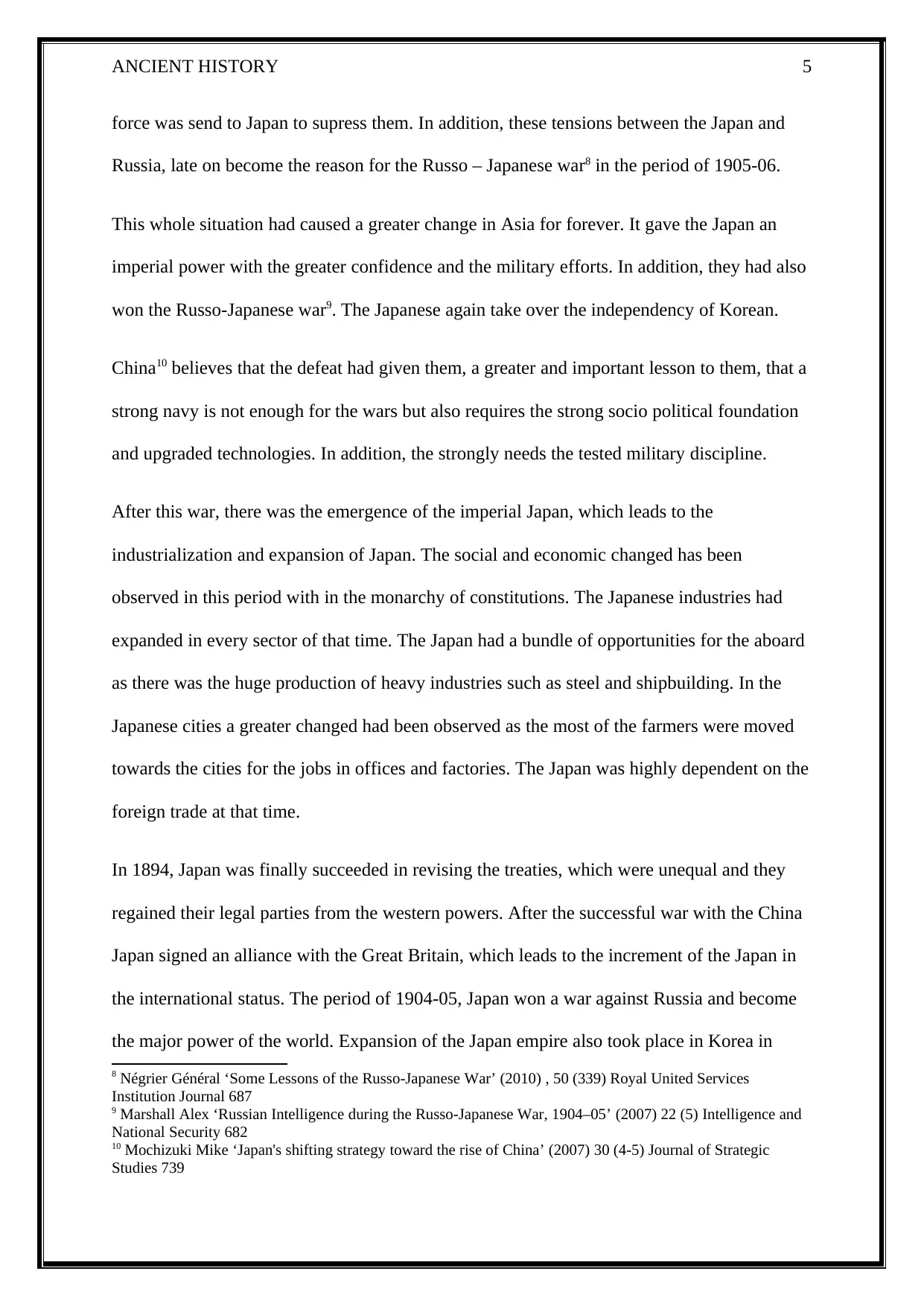
ANCIENT HISTORY 5
force was send to Japan to supress them. In addition, these tensions between the Japan and
Russia, late on become the reason for the Russo – Japanese war8 in the period of 1905-06.
This whole situation had caused a greater change in Asia for forever. It gave the Japan an
imperial power with the greater confidence and the military efforts. In addition, they had also
won the Russo-Japanese war9. The Japanese again take over the independency of Korean.
China10 believes that the defeat had given them, a greater and important lesson to them, that a
strong navy is not enough for the wars but also requires the strong socio political foundation
and upgraded technologies. In addition, the strongly needs the tested military discipline.
After this war, there was the emergence of the imperial Japan, which leads to the
industrialization and expansion of Japan. The social and economic changed has been
observed in this period with in the monarchy of constitutions. The Japanese industries had
expanded in every sector of that time. The Japan had a bundle of opportunities for the aboard
as there was the huge production of heavy industries such as steel and shipbuilding. In the
Japanese cities a greater changed had been observed as the most of the farmers were moved
towards the cities for the jobs in offices and factories. The Japan was highly dependent on the
foreign trade at that time.
In 1894, Japan was finally succeeded in revising the treaties, which were unequal and they
regained their legal parties from the western powers. After the successful war with the China
Japan signed an alliance with the Great Britain, which leads to the increment of the Japan in
the international status. The period of 1904-05, Japan won a war against Russia and become
the major power of the world. Expansion of the Japan empire also took place in Korea in
8 Négrier Général ‘Some Lessons of the Russo-Japanese War’ (2010) , 50 (339) Royal United Services
Institution Journal 687
9 Marshall Alex ‘Russian Intelligence during the Russo-Japanese War, 1904–05’ (2007) 22 (5) Intelligence and
National Security 682
10 Mochizuki Mike ‘Japan's shifting strategy toward the rise of China’ (2007) 30 (4-5) Journal of Strategic
Studies 739
force was send to Japan to supress them. In addition, these tensions between the Japan and
Russia, late on become the reason for the Russo – Japanese war8 in the period of 1905-06.
This whole situation had caused a greater change in Asia for forever. It gave the Japan an
imperial power with the greater confidence and the military efforts. In addition, they had also
won the Russo-Japanese war9. The Japanese again take over the independency of Korean.
China10 believes that the defeat had given them, a greater and important lesson to them, that a
strong navy is not enough for the wars but also requires the strong socio political foundation
and upgraded technologies. In addition, the strongly needs the tested military discipline.
After this war, there was the emergence of the imperial Japan, which leads to the
industrialization and expansion of Japan. The social and economic changed has been
observed in this period with in the monarchy of constitutions. The Japanese industries had
expanded in every sector of that time. The Japan had a bundle of opportunities for the aboard
as there was the huge production of heavy industries such as steel and shipbuilding. In the
Japanese cities a greater changed had been observed as the most of the farmers were moved
towards the cities for the jobs in offices and factories. The Japan was highly dependent on the
foreign trade at that time.
In 1894, Japan was finally succeeded in revising the treaties, which were unequal and they
regained their legal parties from the western powers. After the successful war with the China
Japan signed an alliance with the Great Britain, which leads to the increment of the Japan in
the international status. The period of 1904-05, Japan won a war against Russia and become
the major power of the world. Expansion of the Japan empire also took place in Korea in
8 Négrier Général ‘Some Lessons of the Russo-Japanese War’ (2010) , 50 (339) Royal United Services
Institution Journal 687
9 Marshall Alex ‘Russian Intelligence during the Russo-Japanese War, 1904–05’ (2007) 22 (5) Intelligence and
National Security 682
10 Mochizuki Mike ‘Japan's shifting strategy toward the rise of China’ (2007) 30 (4-5) Journal of Strategic
Studies 739
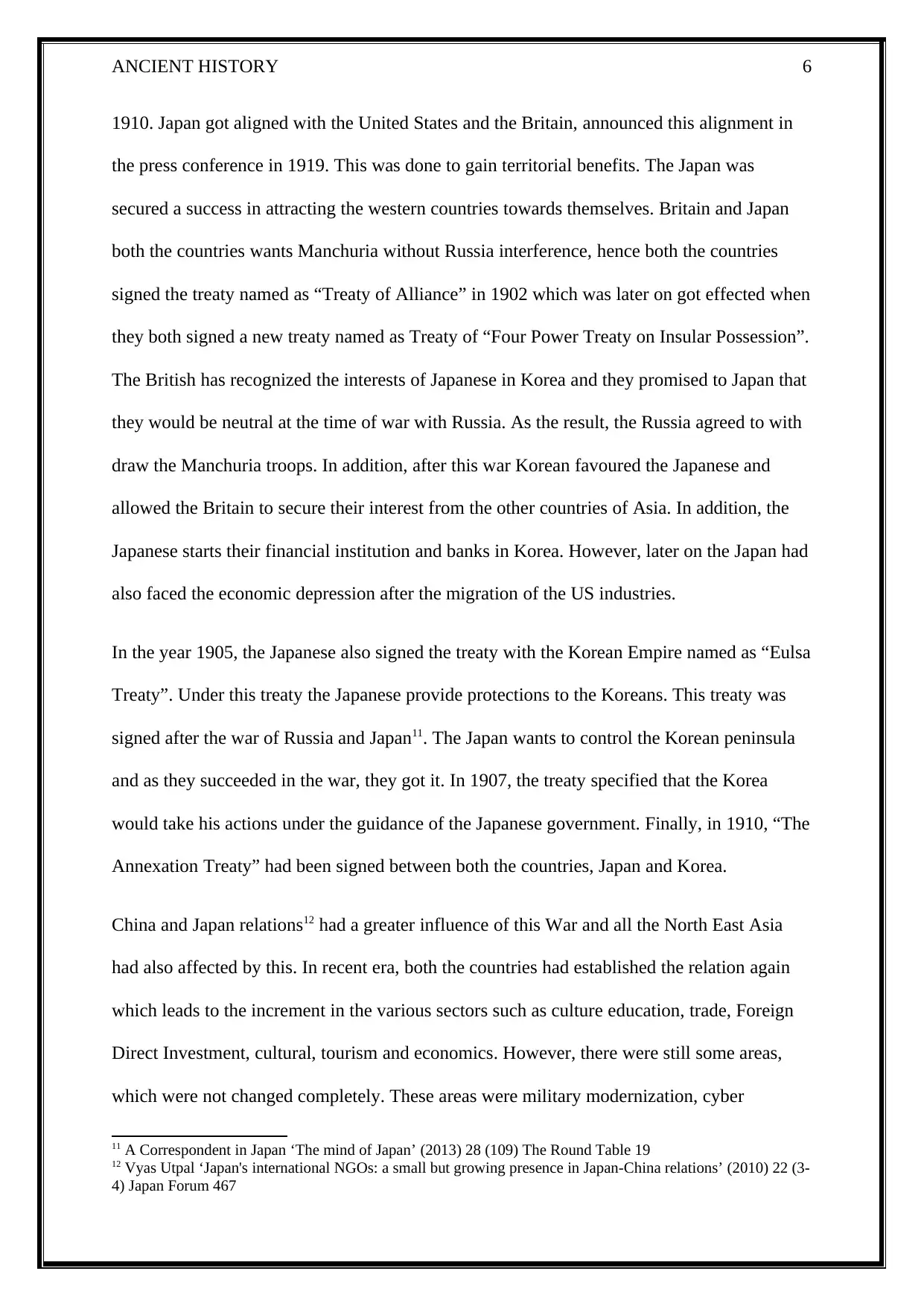
ANCIENT HISTORY 6
1910. Japan got aligned with the United States and the Britain, announced this alignment in
the press conference in 1919. This was done to gain territorial benefits. The Japan was
secured a success in attracting the western countries towards themselves. Britain and Japan
both the countries wants Manchuria without Russia interference, hence both the countries
signed the treaty named as “Treaty of Alliance” in 1902 which was later on got effected when
they both signed a new treaty named as Treaty of “Four Power Treaty on Insular Possession”.
The British has recognized the interests of Japanese in Korea and they promised to Japan that
they would be neutral at the time of war with Russia. As the result, the Russia agreed to with
draw the Manchuria troops. In addition, after this war Korean favoured the Japanese and
allowed the Britain to secure their interest from the other countries of Asia. In addition, the
Japanese starts their financial institution and banks in Korea. However, later on the Japan had
also faced the economic depression after the migration of the US industries.
In the year 1905, the Japanese also signed the treaty with the Korean Empire named as “Eulsa
Treaty”. Under this treaty the Japanese provide protections to the Koreans. This treaty was
signed after the war of Russia and Japan11. The Japan wants to control the Korean peninsula
and as they succeeded in the war, they got it. In 1907, the treaty specified that the Korea
would take his actions under the guidance of the Japanese government. Finally, in 1910, “The
Annexation Treaty” had been signed between both the countries, Japan and Korea.
China and Japan relations12 had a greater influence of this War and all the North East Asia
had also affected by this. In recent era, both the countries had established the relation again
which leads to the increment in the various sectors such as culture education, trade, Foreign
Direct Investment, cultural, tourism and economics. However, there were still some areas,
which were not changed completely. These areas were military modernization, cyber
11 A Correspondent in Japan ‘The mind of Japan’ (2013) 28 (109) The Round Table 19
12 Vyas Utpal ‘Japan's international NGOs: a small but growing presence in Japan-China relations’ (2010) 22 (3-
4) Japan Forum 467
1910. Japan got aligned with the United States and the Britain, announced this alignment in
the press conference in 1919. This was done to gain territorial benefits. The Japan was
secured a success in attracting the western countries towards themselves. Britain and Japan
both the countries wants Manchuria without Russia interference, hence both the countries
signed the treaty named as “Treaty of Alliance” in 1902 which was later on got effected when
they both signed a new treaty named as Treaty of “Four Power Treaty on Insular Possession”.
The British has recognized the interests of Japanese in Korea and they promised to Japan that
they would be neutral at the time of war with Russia. As the result, the Russia agreed to with
draw the Manchuria troops. In addition, after this war Korean favoured the Japanese and
allowed the Britain to secure their interest from the other countries of Asia. In addition, the
Japanese starts their financial institution and banks in Korea. However, later on the Japan had
also faced the economic depression after the migration of the US industries.
In the year 1905, the Japanese also signed the treaty with the Korean Empire named as “Eulsa
Treaty”. Under this treaty the Japanese provide protections to the Koreans. This treaty was
signed after the war of Russia and Japan11. The Japan wants to control the Korean peninsula
and as they succeeded in the war, they got it. In 1907, the treaty specified that the Korea
would take his actions under the guidance of the Japanese government. Finally, in 1910, “The
Annexation Treaty” had been signed between both the countries, Japan and Korea.
China and Japan relations12 had a greater influence of this War and all the North East Asia
had also affected by this. In recent era, both the countries had established the relation again
which leads to the increment in the various sectors such as culture education, trade, Foreign
Direct Investment, cultural, tourism and economics. However, there were still some areas,
which were not changed completely. These areas were military modernization, cyber
11 A Correspondent in Japan ‘The mind of Japan’ (2013) 28 (109) The Round Table 19
12 Vyas Utpal ‘Japan's international NGOs: a small but growing presence in Japan-China relations’ (2010) 22 (3-
4) Japan Forum 467
Paraphrase This Document
Need a fresh take? Get an instant paraphrase of this document with our AI Paraphraser
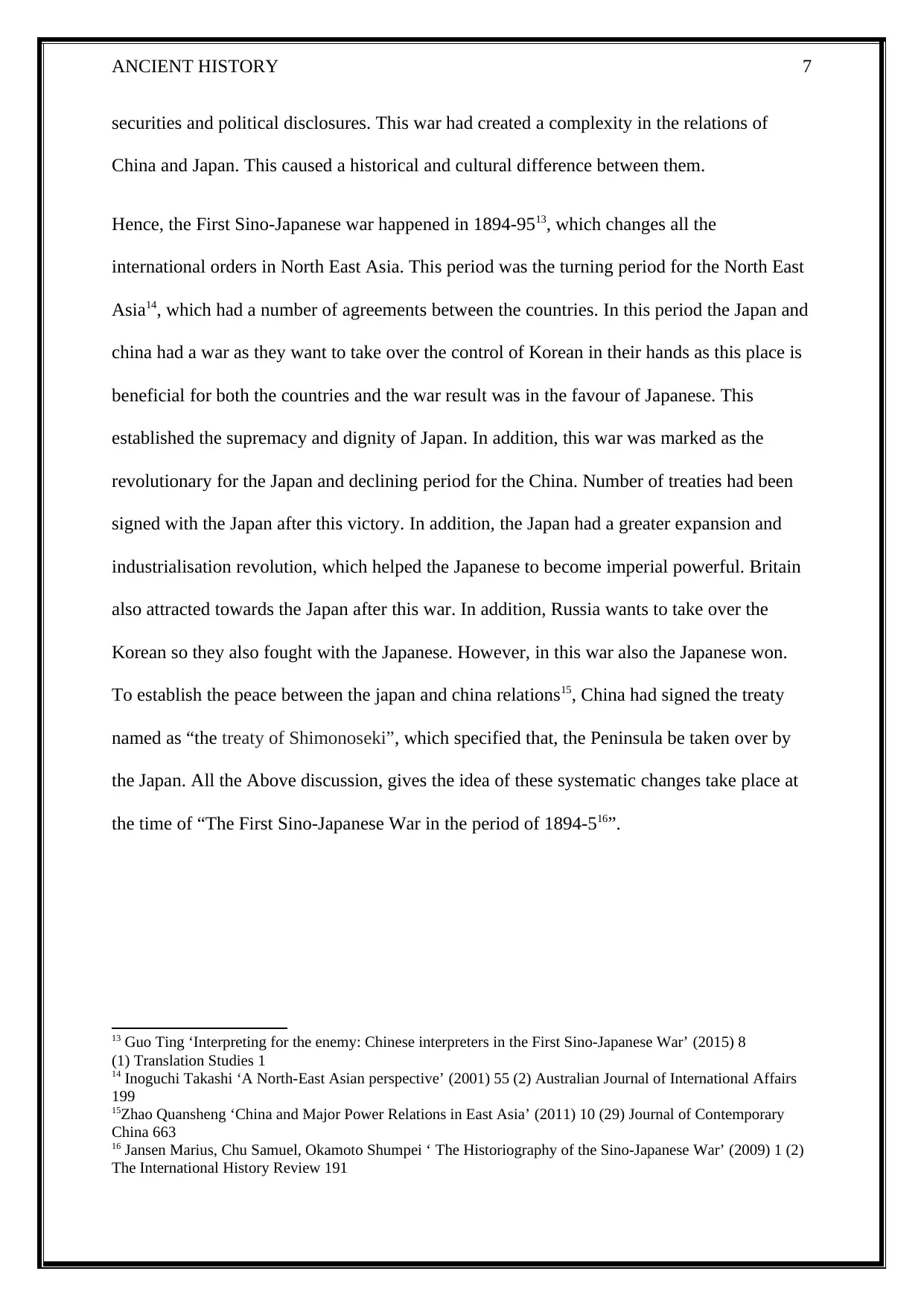
ANCIENT HISTORY 7
securities and political disclosures. This war had created a complexity in the relations of
China and Japan. This caused a historical and cultural difference between them.
Hence, the First Sino-Japanese war happened in 1894-9513, which changes all the
international orders in North East Asia. This period was the turning period for the North East
Asia14, which had a number of agreements between the countries. In this period the Japan and
china had a war as they want to take over the control of Korean in their hands as this place is
beneficial for both the countries and the war result was in the favour of Japanese. This
established the supremacy and dignity of Japan. In addition, this war was marked as the
revolutionary for the Japan and declining period for the China. Number of treaties had been
signed with the Japan after this victory. In addition, the Japan had a greater expansion and
industrialisation revolution, which helped the Japanese to become imperial powerful. Britain
also attracted towards the Japan after this war. In addition, Russia wants to take over the
Korean so they also fought with the Japanese. However, in this war also the Japanese won.
To establish the peace between the japan and china relations15, China had signed the treaty
named as “the treaty of Shimonoseki”, which specified that, the Peninsula be taken over by
the Japan. All the Above discussion, gives the idea of these systematic changes take place at
the time of “The First Sino-Japanese War in the period of 1894-516”.
13 Guo Ting ‘Interpreting for the enemy: Chinese interpreters in the First Sino-Japanese War’ (2015) 8
(1) Translation Studies 1
14 Inoguchi Takashi ‘A North-East Asian perspective’ (2001) 55 (2) Australian Journal of International Affairs
199
15Zhao Quansheng ‘China and Major Power Relations in East Asia’ (2011) 10 (29) Journal of Contemporary
China 663
16 Jansen Marius, Chu Samuel, Okamoto Shumpei ‘ The Historiography of the Sino-Japanese War’ (2009) 1 (2)
The International History Review 191
securities and political disclosures. This war had created a complexity in the relations of
China and Japan. This caused a historical and cultural difference between them.
Hence, the First Sino-Japanese war happened in 1894-9513, which changes all the
international orders in North East Asia. This period was the turning period for the North East
Asia14, which had a number of agreements between the countries. In this period the Japan and
china had a war as they want to take over the control of Korean in their hands as this place is
beneficial for both the countries and the war result was in the favour of Japanese. This
established the supremacy and dignity of Japan. In addition, this war was marked as the
revolutionary for the Japan and declining period for the China. Number of treaties had been
signed with the Japan after this victory. In addition, the Japan had a greater expansion and
industrialisation revolution, which helped the Japanese to become imperial powerful. Britain
also attracted towards the Japan after this war. In addition, Russia wants to take over the
Korean so they also fought with the Japanese. However, in this war also the Japanese won.
To establish the peace between the japan and china relations15, China had signed the treaty
named as “the treaty of Shimonoseki”, which specified that, the Peninsula be taken over by
the Japan. All the Above discussion, gives the idea of these systematic changes take place at
the time of “The First Sino-Japanese War in the period of 1894-516”.
13 Guo Ting ‘Interpreting for the enemy: Chinese interpreters in the First Sino-Japanese War’ (2015) 8
(1) Translation Studies 1
14 Inoguchi Takashi ‘A North-East Asian perspective’ (2001) 55 (2) Australian Journal of International Affairs
199
15Zhao Quansheng ‘China and Major Power Relations in East Asia’ (2011) 10 (29) Journal of Contemporary
China 663
16 Jansen Marius, Chu Samuel, Okamoto Shumpei ‘ The Historiography of the Sino-Japanese War’ (2009) 1 (2)
The International History Review 191
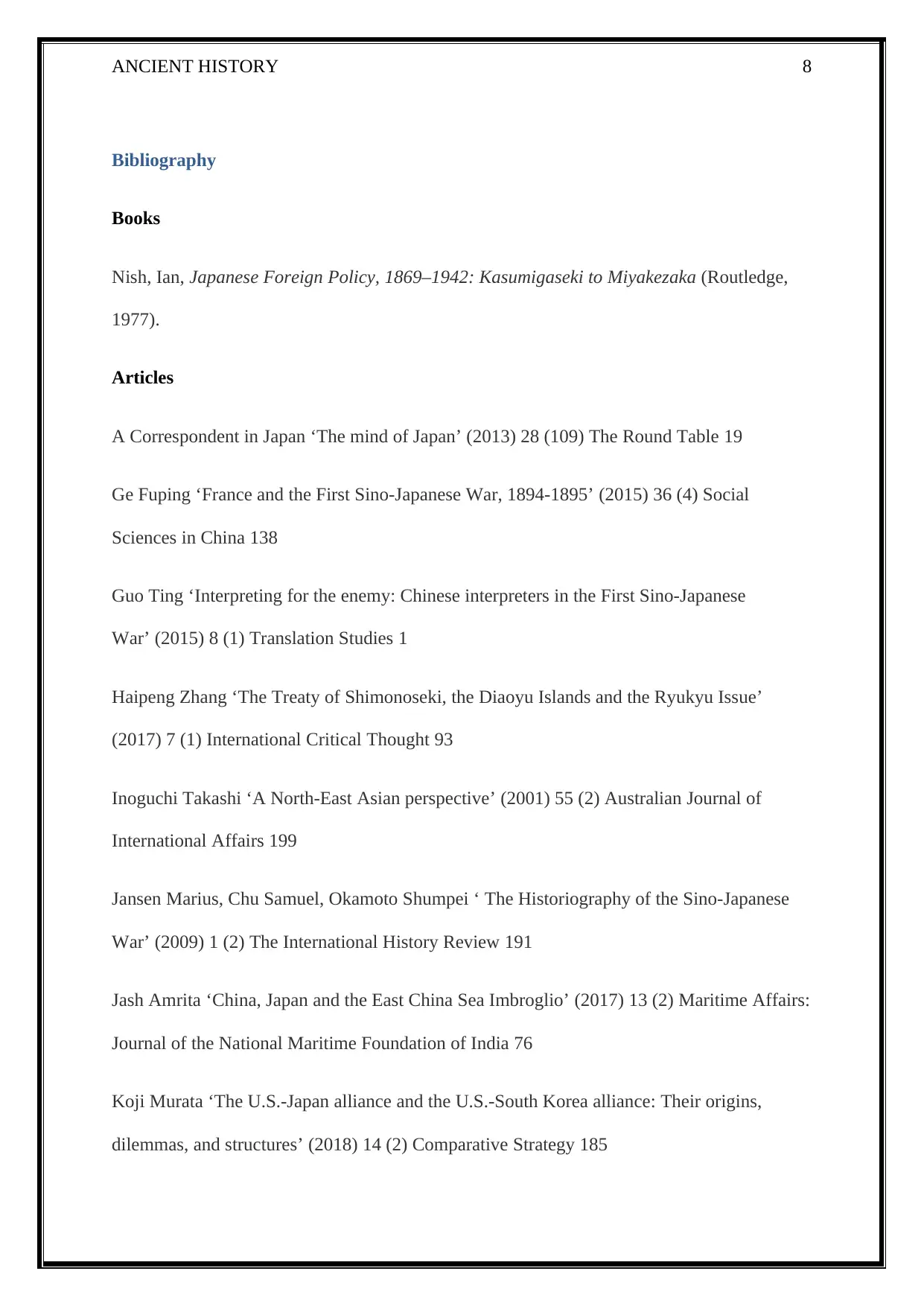
ANCIENT HISTORY 8
Bibliography
Books
Nish, Ian, Japanese Foreign Policy, 1869–1942: Kasumigaseki to Miyakezaka (Routledge,
1977).
Articles
A Correspondent in Japan ‘The mind of Japan’ (2013) 28 (109) The Round Table 19
Ge Fuping ‘France and the First Sino-Japanese War, 1894-1895’ (2015) 36 (4) Social
Sciences in China 138
Guo Ting ‘Interpreting for the enemy: Chinese interpreters in the First Sino-Japanese
War’ (2015) 8 (1) Translation Studies 1
Haipeng Zhang ‘The Treaty of Shimonoseki, the Diaoyu Islands and the Ryukyu Issue’
(2017) 7 (1) International Critical Thought 93
Inoguchi Takashi ‘A North-East Asian perspective’ (2001) 55 (2) Australian Journal of
International Affairs 199
Jansen Marius, Chu Samuel, Okamoto Shumpei ‘ The Historiography of the Sino-Japanese
War’ (2009) 1 (2) The International History Review 191
Jash Amrita ‘China, Japan and the East China Sea Imbroglio’ (2017) 13 (2) Maritime Affairs:
Journal of the National Maritime Foundation of India 76
Koji Murata ‘The U.S.‐Japan alliance and the U.S.‐South Korea alliance: Their origins,
dilemmas, and structures’ (2018) 14 (2) Comparative Strategy 185
Bibliography
Books
Nish, Ian, Japanese Foreign Policy, 1869–1942: Kasumigaseki to Miyakezaka (Routledge,
1977).
Articles
A Correspondent in Japan ‘The mind of Japan’ (2013) 28 (109) The Round Table 19
Ge Fuping ‘France and the First Sino-Japanese War, 1894-1895’ (2015) 36 (4) Social
Sciences in China 138
Guo Ting ‘Interpreting for the enemy: Chinese interpreters in the First Sino-Japanese
War’ (2015) 8 (1) Translation Studies 1
Haipeng Zhang ‘The Treaty of Shimonoseki, the Diaoyu Islands and the Ryukyu Issue’
(2017) 7 (1) International Critical Thought 93
Inoguchi Takashi ‘A North-East Asian perspective’ (2001) 55 (2) Australian Journal of
International Affairs 199
Jansen Marius, Chu Samuel, Okamoto Shumpei ‘ The Historiography of the Sino-Japanese
War’ (2009) 1 (2) The International History Review 191
Jash Amrita ‘China, Japan and the East China Sea Imbroglio’ (2017) 13 (2) Maritime Affairs:
Journal of the National Maritime Foundation of India 76
Koji Murata ‘The U.S.‐Japan alliance and the U.S.‐South Korea alliance: Their origins,
dilemmas, and structures’ (2018) 14 (2) Comparative Strategy 185
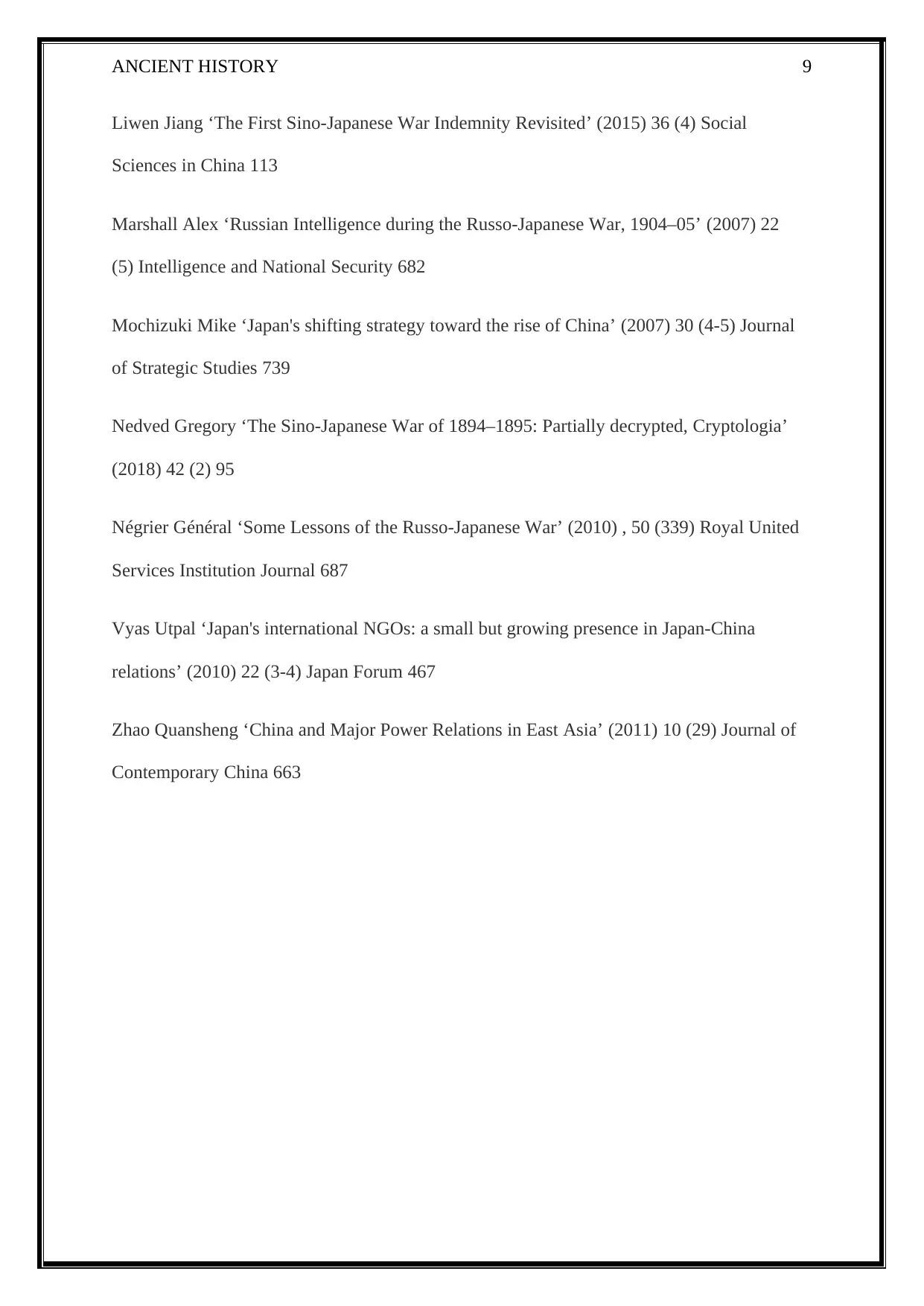
ANCIENT HISTORY 9
Liwen Jiang ‘The First Sino-Japanese War Indemnity Revisited’ (2015) 36 (4) Social
Sciences in China 113
Marshall Alex ‘Russian Intelligence during the Russo-Japanese War, 1904–05’ (2007) 22
(5) Intelligence and National Security 682
Mochizuki Mike ‘Japan's shifting strategy toward the rise of China’ (2007) 30 (4-5) Journal
of Strategic Studies 739
Nedved Gregory ‘The Sino-Japanese War of 1894–1895: Partially decrypted, Cryptologia’
(2018) 42 (2) 95
Négrier Général ‘Some Lessons of the Russo-Japanese War’ (2010) , 50 (339) Royal United
Services Institution Journal 687
Vyas Utpal ‘Japan's international NGOs: a small but growing presence in Japan-China
relations’ (2010) 22 (3-4) Japan Forum 467
Zhao Quansheng ‘China and Major Power Relations in East Asia’ (2011) 10 (29) Journal of
Contemporary China 663
Liwen Jiang ‘The First Sino-Japanese War Indemnity Revisited’ (2015) 36 (4) Social
Sciences in China 113
Marshall Alex ‘Russian Intelligence during the Russo-Japanese War, 1904–05’ (2007) 22
(5) Intelligence and National Security 682
Mochizuki Mike ‘Japan's shifting strategy toward the rise of China’ (2007) 30 (4-5) Journal
of Strategic Studies 739
Nedved Gregory ‘The Sino-Japanese War of 1894–1895: Partially decrypted, Cryptologia’
(2018) 42 (2) 95
Négrier Général ‘Some Lessons of the Russo-Japanese War’ (2010) , 50 (339) Royal United
Services Institution Journal 687
Vyas Utpal ‘Japan's international NGOs: a small but growing presence in Japan-China
relations’ (2010) 22 (3-4) Japan Forum 467
Zhao Quansheng ‘China and Major Power Relations in East Asia’ (2011) 10 (29) Journal of
Contemporary China 663
1 out of 10
Related Documents
Your All-in-One AI-Powered Toolkit for Academic Success.
+13062052269
info@desklib.com
Available 24*7 on WhatsApp / Email
![[object Object]](/_next/static/media/star-bottom.7253800d.svg)
Unlock your academic potential
© 2024 | Zucol Services PVT LTD | All rights reserved.





